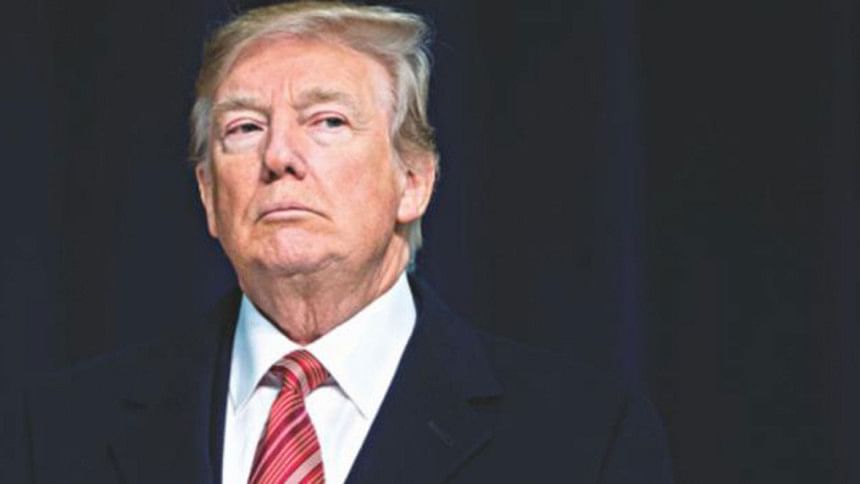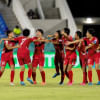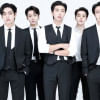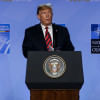World avoided nuclear catastrophe: Trump

Donald Trump accepted an invitation from Kim Jong Un to visit North Korea during their historic summit, Pyongyang state media reported today, as the US president said the world had jumped back from the brink of "nuclear catastrophe".
Tuesday's unprecedented encounter in Singapore saw the leader of the world's most powerful democracy shake hands with Kim, the third generation scion of a dynastic dictatorship, as they stood as equals in front of their nations' flags.
The World has taken a big step back from potential Nuclear catastrophe! No more rocket launches, nuclear testing or research! The hostages are back home with their families. Thank you to Chairman Kim, our day together was historic!
— Donald J. Trump (@realDonaldTrump) June 13, 2018
In a characteristically bullish tweet, Trump said the first-ever summit between sitting leaders of the two Cold War foes meant "the World has taken a big step back from potential Nuclear catastrophe!"
"No more rocket launches, nuclear testing or research! The hostages are back home with their families. Thank you to Chairman Kim, our day together was historic!"In a joint statement following the talks, Kim agreed to the "complete denuclearisation of the Korean Peninsula" -- a stock phrase favoured by Pyongyang that stopped short of long-standing US demands for North Korea to give up its atomic arsenal in a "verifiable" and "irreversible" way.
In its first report on the landmark summit, the official KCNA news agency ran a glowing dispatch on the talks, describing them as an "epoch-making meeting" that would help foster "a radical switchover in the most hostile (North Korea)-US relations".
The report said the two men each asked the other to visit their country.
"The two top leaders gladly accepted each other's invitation," KCNA said.
It asserted that Trump had "expressed his intention" to lift sanctions against the North -- something the US president had told a blockbuster press conference would happen "when we are sure that the nukes are no longer a factor".
"The sanctions right now remain," he added.
With the headline: "Meeting of the century opens new history in DPRK-US relations", the North's ruling Workers Party official daily Rodong Sinmun splashed no fewer than 33 pictures across four of its usual six pages.
One of the pictures showed a smiling Kim shaking hands with Trump's hawkish National Security Advisor John Bolton, who has previously advocated military action against the North, which in turn has referred to him as "human scum."
'War games'
Pyongyang has reason to feel confident after the meeting, a major coup for an isolated and heavily sanctioned regime that has long craved international legitimacy.
"Kim Jong Un got what he wanted at the Singapore Summit: the international prestige and respect of a one-on-one meeting with the American president, the legitimacy of North Korean flags hanging next to American flags in the background," said Paul Haenle, director of the Carnegie-Tsinghua Center.
In his post-summit press conference, Trump made the surprise announcement that the US would halt joint military exercises with its security ally Seoul -- something long sought by Pyongyang, which claims the drills are a rehearsal for invasion.
The US stations around 30,000 troops in security ally South Korea to protect it from its neighbour, which invaded in 1950 in an attempt to reunify the peninsula by force.
"We will be stopping the war games which will save us a tremendous amount of money," Trump told reporters, adding that "at some point" he wanted to withdraw US troops from the South.
Both Seoul and US military commanders in the South indicated they had no idea the announcement was coming, and in an editorial Wednesday the Korea Herald said it was "worrisome".
Smiles and handshakes
The Singapore summit was a potentially legacy-defining meeting for both men -- comparable to president Richard Nixon's 1972 visit to China, or Ronald Reagan's 1986 summit with Mikhail Gorbachev in Reykjavik.
Only a few months ago, the pair were swapping personal insults such as "dotard" and "little rocket man" and the North conducted its six and most powerful nuclear test, as well as firing missiles over Japan.
Trump vowed to rain down "fire and fury" on Pyongyang if it threatened the US but instead in Singapore it was compliments that flowed, as the president described Kim as "talented" and said they had forged a "special bond."
After a day filled with smiles and handshakes watched around the world, the US "committed to provide security guarantees" to North Korea.
But critics charged that the summit legitimised Kim, whose regime has been accused of multiple human rights abuses, and said the summit was more about headlines than substantive progress.
Trump said the US would be checking Kim's progress towards denuclearisation "very strongly" but many agreements made in the past with North Korea have later fallen apart.
World powers from China to Japan, the European Union and Russia welcomed its outcome -- while cautioning it was only the first step towards resolving the nuclear stand-off with Pyongyang.
But some media in Japan, which North Korea has in the past threatened to "sink into the sea", were cautious.
"The real bargaining has now started between the US and North Korea. Problems that cannot be solved through a bling-bling political show remain on both sides," said the liberal Mainichi Shimbun.

 For all latest news, follow The Daily Star's Google News channel.
For all latest news, follow The Daily Star's Google News channel. 









Comments